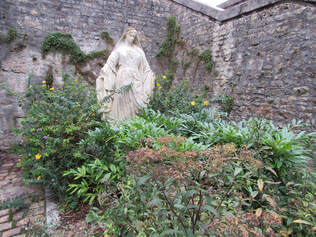 Henry Bannister dearly loved his wife, but he didn’t understand some of the things that she did. They were married soon after she got off the ship in the New Orleans harbor, on June 6, 1950, brought there under the sponsorship of the Napoleon Avenue Baptist Church of New Orleans. Her maiden name was Nonna Lisowskaja and she was from Germany, having been born in Frankfurt. She served as a nurse in different German hospitals and had come to the United States because her deceased parents would have been proud. She said nothing beyond that, telling Henry that she only wanted to focus on their future happiness. She began, however, to make frequent trips up to their Tennessee home’s attic, where she spent hours, alone. There were also distracted moments when she was full of sadness and despair. And then there was the pillow case; there was always the pillow case. It was a small now-empty pillow made of black-and-white ticking, with an added strap, as if the pillow was to be carried over the shoulder. Every night, for all the nights that he knew her, Nonna held it as she went to sleep. She could not sleep without it, requiring it even in hospital stays. It was all okay with Henry; he never demanded an explanation of the pillowcase, and faithfully respected her private moments in the attic. He never opened her trunk. Then, one day, almost fifty years after they had married, she came to him, took him by the time, and said, “It’s time.” She led him to the attic, unlocked a trunk, and took out a locked box. From it, she removed a number of ancient photographs, letters, documents, postcards, and then carefully placed into his hands a fragile, hand-sewn diary, filled with words in languages he did not recognize. Knowing that he could not decipher her writing, Nonna gave him a thick stack of legal pads, each page filled with the hand-penned English translation of what she had written. Reading page after page, Henry finally discovered why Nonna desperately clung to that pillowcase. Carefully concealed around her waist, it had been her secret repository for all that she considered precious. She had not been born in Frankfurt, but in the very southern tip of Russia. She had kept the pillowcase hidden from Russian soldiers fleeing the German soldiers as they invaded southern Russia; from German soldiers who ransacked her grandmother’s Great House in the Ukraine and murdered her father; from the shelling of her town by the returning, westward-going Russian army; and from the people crammed into the cattle cars that took her and her mother to work camps in Poland. She had secreted the small pillowcase in different German concentration camps, in the German hospital where she served as an interpreter for patients and as a patient herself, and even wore it on the ship to America. It contained her memories of a family that stretched from the Tsars of Russia, to Anton Chekov, to Alexander Solzhenitsyn, to wonderful days at a Great House in the Ukraine, to the unwarranted deaths of her family members, and it even held an anonymous letter that told of her mother being burned alive in a crematorium. Henry could hardly take it all in, but he read every word. Afterwards, having revealed her past to him, Nonna shared it with her family, then her church, and then spoke to anyone who would listen. She had a story that everyone should hear and that no one should forget. Nonna’s maternal grandfather was Yakov Ljaschov, a Cossack in the Imperial Cossack Army. He served as the personal protection for Nicholas II, the Tsar of Russia, and was killed by the Bolsheviks during the Russian revolution at the end of WWI. He and his wife, Feodosija Nikolayevna Ljaschova, were wealthy landowners in the Ukraine and southern Russia, owning seven grain mills, with associated houses and villages, plus other lands. The traditional family home was called the Great House and was close to the village of Konstantinowka, Ukraine, in the same general area as Taganrog but across the border from Russia. It had thirty-seven rooms and four kitchens, plus a complex of stables, barns, caretaker cottages, and large pastures and orchards. This is where her grandmother lived during Nonna’s childhood, and where Anna Yakovlevna Ljaschova, Nonna’s mother, had grown up. Nonna’s father was named Yevgeny Ivanovich Lisowsky. He came from Warsaw, Poland. His parents were wealthy and owned considerable land around Warsaw and in the Ukraine. Stick with me here. I won’t use the proper names again, but can’t help but love the way they look and sound. It is important that Nonna’s father grew up wealthy and learned to speak several languages, and it is important that her mother grew up wealthy and became a gifted musician and performer (voice, piano, violin). Together, they were a power couple, and they settled in Rostov-On-Don, a Russian town near Taganrog that had a local university. It is also important that they were not Jewish; the family, friends, and neighbors were dominantly Eastern Orthodox. This makes Nonna’s tale a non-typical Holocaust story. Unfortunately, the region in which Nonna’s family lived and the ancestral farm was located was directly in the path of the German army going east when Germany betrayed the Soviet Union and invaded Russia, and then directly in the path of the Russian army going west when the Germans were defeated at Stalingrad, and the Soviet Union went on the offensive. Nonna tells her story in a book titled The Secret Holocaust Diaries, The Untold Story of Nonna Bannister, published by Tyndale House in 2009. She spends the first half of the book extolling her ancestry and the delightful dominance of her maternal grandmother. It is an idyllic life that centered around the Great House. Lots of aunts, uncles, cousins, food, homemade cherry wine, animals, and sleigh rides in the winter. The Christmas of 1932 is everything that we wish for when we see a Thomas Kinkade Christmas scene. Meanwhile, growing up in Rostov-On-Don, Nonna and her mother developed a friendship with Mrs. Taissia Shcherbak Solzhenitsyna. Her husband had also died being a Cossack for Tsar Nicholas, so they had common stories. They also met her son, Aleksandr Solzhenitsyn, a budding mathematician whose future book, One Day in the Life of Ivan Denisovich, would win him the Nobel Prize in Literature. In 1933, Hitler comes to power in Germany, Stalin’s Communism is on the rise in Russia, and everything changes. Most farms in the Soviet Union become government “collective farms” and in 1934-35, Nonna’s extended family members, including her grandmother, lose most of their wealth and property. The grandmother is no longer considered a private owner, and is forced to pay heavy taxes on the land, house, stables, and orchards. The horses are “donated” to the collective, and she no longer has “hired help”, as it becomes unlawful to have employees. People are told how many “living things” (goats, hogs, chickens, etc.) they can own, while any excess is given to the collective farms. The family mills become the property of the government and are operated to benefit the collective. Religion is forbidden, the churches are locked and boarded up, the local priest suddenly disappears, while bibles and icons, if found, are burned and people arrested. The grandmother’s religious icons, jewelry, beautiful clothes, gold, silver, and other valuables are packed into metal trunks and buried in the ground in the cellar. The Great House is divided up into living spaces with private entrances. To preserve their ancestors’ homestead, several family members move back to the house, including Nonna, her brother, Anatoli, her mother, and her father. As an aside, it’s remarkable how Stalin’s Communism resembles the Borg in Star Trek. The individual has no value, while the collective is everything. Perhaps they were striving for equity. In 1939, Hitler signs a non-aggression pact with the Soviet Union, and promptly invades Poland. Once his army completes the occupation, Hitler then breaks the pact and invades Russia in 1941. By the time he gets to the east side of the Ukraine, the Russian soldiers are fleeing back to the homeland, using a scorched earth policy as they leave so the Germans will find no food or supplies. Villagers and homeowners are told to board trains to escape into Russia’s interior, but some stay. Along with a few villagers, Nonna’s grandmother refuses to leave the Great House. Nonna’s father, who had been wanting to escape the Communism of Russia for some time, convinces himself that if his family stays and surrenders to German soldiers, they will allow he and his family to flee to Germany. I’ll tell you how that worked out in Part Two.
1 Comment
Donna Hill
3/15/2022 04:44:59 pm
So interesting!’n. Eager to read more. Thanks for posting.
Reply
Leave a Reply. |
AuthorDon Willerton has been a reader all his life and yearns to write words like the authors he has read. He's working hard at it and invites others to share their experiences. |

 RSS Feed
RSS Feed